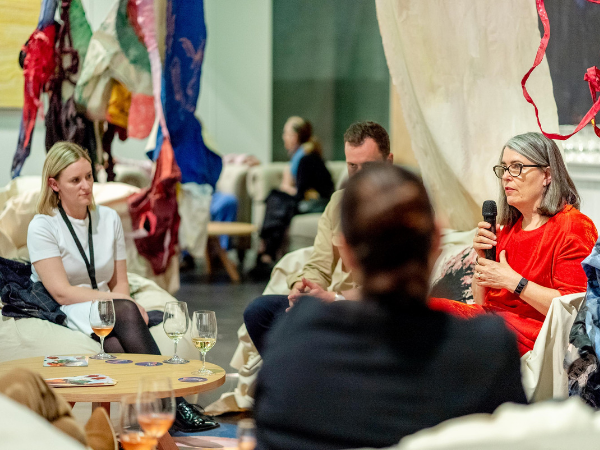In conversation with Karen Black
In 2018, we built an immersive 'Art Bar' with Karen Black for Sydney Contemporary. Working with Karen was an incredible experience for our team. A year later, we caught up with Karen to find out more about her creative process.
- How did you become an artist?
Karen Black: I don’t even know if there even was a beginning because as a child I would always make things all the time. Because I grew up in a little country town outside of Brisbane called Toogoolawah. It had like three hotels and one street. So as children, we were just like free-running chickens. We were all like playing at the creek, we used to catch birds in the wild, birds that are now nearly extinct, we just caught them all the time. So I always made things like baskets, always did sewing and painting and things like that. And that was just a natural progression toward what I am doing now. But I never saw it as being an artist, I just saw it as what I did.

- Do you think because of the way you grew up, it shaped the style of art you do now?
I don’t know about shaped the style, I guess there’s something in that, that comes from that period of time in my life. And all of the other history that is my history. But I have to say that when I went to uni, which was in 2008, I went to university to do a fine arts degree, that was more like the consolidation of everything. In Griffith, at Queensland College of Art. So that consolidated all of those skills that I had. So you could say that that was the beginning of my art practice on a professional level.
- Do you have a specific process for creating art?
First of all, I never think “I want to create art”, I don’t ever think about it like that. It’s always that I’m researching on something or I’m really interested in something, and then I’ll start playing with materials. And that usually involves paint, but not always. And quite often I will make little things in the studio out of scraps. So I like to use everything I have. I like to use the scraps of canvas, I use scraps of fabric, I use cottons and. I have a collection of fabrics from the theatre when I worked there I quite often cut them off and sink them in concrete. And do lots of things like that sort of. I just kind of play with materials and then if I’m researching something that kind of comes out in the work. But I think it’s dangerous to think “I’m gonna make art right now, because it’s like a downhill slide, do you know what I mean? Haha
- I guess for you, it comes more naturally?
I guess you just got to put in the work, just working, you just work all the time on it, until you kind of come to a stage where you feel it’s resolved, and saying everything you want to say, or doing everything you want it to do.

- Why do you think the collaboration between you and Handpicked Wines works so well?
I think initially this friend of mine gave me a dark red burgundy-coloured velvet bean bag to use. And I think that was my first thought of like “Oh well wine is actually a colour” you know? And the wine I like can range from like pale apricoty sort of pink colour through to dark black red colours, and so I thought maybe I’d you that bean bag as my starting point to make this work. But then from there I worked really really abstractly, there were a number of things to think about like, there might be 50 people who are going to be at this bar, so we don’t want people tripping over things, we want them to be comfortable so I was then brought in a whole lot of parameters that I had to work with in the space. So it was about creating a space, but I did keep going back to that bean bag, that colour, “let’s use red” as a colour that maybe we can use as consistency through all of the work and all the other colours.
- How did it all come together?
Just sort of tie it together and sort of, the work got to a stage where I worked on it a lot, but I needed something consistent, and that was going back to the research, back to “okay, that’s the red bean bag”, red is going to be what’s strewn through all the artwork to try and bring it together. So that was more like working like an interior designer, by doing that, so I had to bring that part of it into it too.

- You had solo exhibitions and group exhibitions all around the world. How do you think people with different backgrounds react to your art?
Well it depends what their background is and what kind of the layers of history are in their lives, and everyone looks through their own lens at a work. I think when I make work in Asia, a lot of people see Chinese ink painting , you can look a cloud for instance, and see an image of something in a cloud, in Chinese ink paintings like that. There is a lot of freedom to that, but there’s also a structure and discipline to that. People have talked about that in my work. Because I do have a structure and discipline, but I’m also really experimental in my work.
- So people can relate to that?
I think people can relate to that, and I think different people see different things at all different levels in the work. But in saying that, we are all people and we’re all human beings, and we all have that kind of thing of humanity together the collective way of thinking that we see things the same as well.
- How did you feel right after Sydney Contemporary, being here and talking to people, how do you feel about people just sitting on your art?
I actually love it and the more people in here the better. Yesterday there were like kids sleeping while their parents were talking, and I thought at least the kids will shut up while the parents are having a chat. The kids were like “this is so boring” you know? And my kids were like that, they were so bored with things, but loved lying on the bean bags, so we kind of got to give parents sometime to chat by themselves. I’ve seen people sleep ion the furniture like literal snoring. I love that they’ve come here and just zoned out. And also all the conversations that are happening when they’re having a glass of wine, that’s really really nice. When I first saw the work and there was nobody in it I was like “it’s not complete.” I didn’t feel fulfilled to see it as it was. Because only when the people are in it that it works.
Sydney contemporary 2019
The Fair will be open to visitors from 12-15 September 2019 with the Opening Night taking place on Thursday 12 September at Carriageworks.
As a follower of Handpicked Wines, Sydney Contemporary is delighted to offer you 20% off tickets! - To purchase tickets click here. Sydney Contemporary opening hours are:
-
Thursday 12 September, 12noon - 5pm
-
Friday 13 September, 12noon - 8pm
-
Saturday 14 September, 11am - 6pm
-
Sunday 15 September, 11am - 6pm
